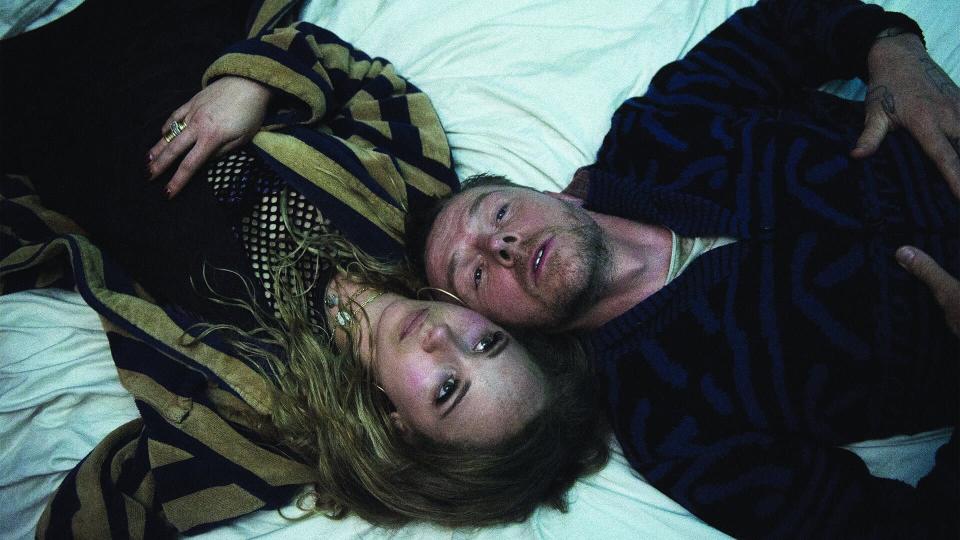Why Simon Pegg went dramatic for 'Lost Transmissions'
Simon Pegg isn’t a comedian, but he often plays one on the big screen. A serious student of literature and theater during his school days in England, the actor-writer-producer landed his breakout role in the late, great 1999 Britcom Spaced, directed by his longtime collaborator Edgar Wright. Spaced led directly to the duo’s beloved 2004 zombie comedy, Shaun of the Dead, which single-handedly transformed Pegg into a geek icon on both sides of the Pond. But it also established him in viewers’ minds as a comic actor — a persona he leaned into in his subsequent movies with Wright, as well as appearances in major franchises like Star Trek and Mission: Impossible. But it wasn’t the role he saw himself as playing when he first started out. “Comedy was something I drifted into through chance,” Pegg tells Yahoo Entertainment. “I trained as an actor, and hadn’t planned specifically to do just comedy.” (Watch our video interview above.)
Audiences will have the chance to see Pegg put his dramatic training to great use in the film, Lost Transmissions, which had its world premiere at the Tribeca Film Festival this week. Written and directed by Katherine O’Brien, the film casts the 49-year-old actor as Theo, a Los Angeles-based music producer suffering from schizophrenia. While he’s been able to hold onto his career so far, his condition is worsening and the patience of his friends and clients is wearing thin. Enter Hannah (Juno Temple), an up-and-coming singer who sees a kindred spirit in Theo and takes it upon herself to be his support system. O’Brien based the film on the real-life experiences of a music producer with schizophrenia, and thought of Pegg for the role despite his lighter, funnier screen image. “I was really flattered she considered me for the role,” he says. “I’d never worked with a female director on a feature film and that felt terribly remiss. The opportunity to do a script like this, and work with Katherine made it a no-brainer.”

Taking on the role also meant taking on an intensive research process into what it means to live with schizophrenia. Pegg describes a pre-filming regimen that included screening multiple documentaries, extensive meetings with actual patients and a long reading list, all in service of ensuring that he captured the reality of the condition onscreen. “It’s often misunderstood … and talked about in a jokey way — people talk about ‘going schizo.’ This language that we use so often in our society often diminishes mental illness. So it felt like, ‘Let’s get this right and portray what it is in a way that’s faithful and authentic.’”
One mistaken impression that he particularly wanted to correct was the notion that schizophrenia involves multiple personalities. “[Schizophrenics] are receiving so much information and their brains are trying to contend with it, and rationalize it. It’s a barrage of information and sounds and auditory hallucination. When you see someone walking down the street shouting or talking to themselves, that’s what’s happening to them. They’re not just a subsection of society that needs to be ignored. That person is going through something extraordinarily overwhelming and difficult. It’s not a surprise that you often see those people homeless as well; they find themselves very quickly shut out of mainstream society.”
The fact that Theo happens to be an artist in Lost Transmissions had the potential to play into another cliché: the notion that the finest artists are those that walk the closest to the edge of sanity. It’s a myth that’s exploded in one of the film’s most memorable scenes, which finds Theo in the middle of mixing a song when he experiences a schizophrenic episode. As he twists the dials and pushes the levels, the track initially transforms from a middling tune into a great one, so much so that everyone in the recording studio takes immediate notice. “That moment is where they start to talk about whether the condition assists him in some way or gives him access to some other part of his brain,” Pegg points out. But Theo is unable to stop there, quickly pushing the song out of the realm of listenable music into pure noise — the aural equivalent of what’s going on inside his own head.
For Pegg, it was important for audiences to understand the distinction between an artist knowingly venturing off the beaten path and a person unable to control their own impulses. “All the best artists get called [crazy] because what they’re doing is unusual. As an artist, you need to be in touch with your emotional responses and you have to be very focused on what your perception of reality is. [But] schizophrenia and depression are medical conditions. They might give you access to ideas you might not have if you were completely straight, but that’s not necessarily a good thing.”
Even as Lost Transmissions seems poised to open up dramatic new avenues in Pegg’s career, he’s got a very important mission to complete before revisiting this territory. The actor says he’s going to spend 2020 shooting back-to-back Mission: Impossible movies with Tom Cruise and Christopher McQuarrie. “I got a lot of message from McQuarrie the other day — it’s going to be really good,” he teases. “It’s nice to know I’m going to be busy for a year! I’ve got to get all my ducks in a row before January, because that’s it. I’m out of the game for all of 2020, but that’s a nice position to be in.”
Lost Transmissions is currently screening at the Tribeca Film Festival.
5 things we learned about 'This Is Spinal Tap' at the Tribeca Film Festival reunion
Did Chucky just kill Woody? Shocking 'Child's Play' poster roasts 'Toy Story 4'
Want daily pop culture news delivered to your inbox? Sign up here for Yahoo Entertainment & Lifestyle’s newsletter.

